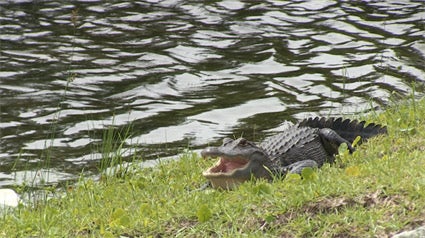Keep an eye out for alligators
Published 9:43 am Wednesday, August 4, 2021

- Alligators are part of the natural fauna in the coastal region of N.C. and very seldom pose a threat to humans, however, they can become a nuisance when people intentionally or unintentionally feed them.
|
Getting your Trinity Audio player ready...
|
RALEIGH, N.C. — This time of year, alligators are moving around a lot on the southeastern North Carolina landscape. They are looking for food and mates after spending the winter in brumation—a long period in which they don’t eat and seldom come out of their dens.
Alligators are part of the natural fauna in the coastal region of the state and very seldom pose a threat to humans. However, they can become a nuisance when people intentionally or unintentionally feed them. Alligators’ natural behavior is to fear and avoid humans, but being fed by people teaches them to lose that fear and associate humans with an easy meal. For this reason, feeding alligators is a violation of state law.
To avoid unintentionally feeding alligators, officials with the N.C. Wildlife Resources Commission recommend not feeding any other wild animals in coastal waters where alligators live, including ducks, geese, fish and turtles. Anglers can also help by taking their fish scraps with them or disposing of them in a trash receptacle rather than throwing them in the water.
Seeing an alligator in the wild is no cause for alarm, said Alicia Davis, the Wildlife Commission’s alligator biologist.
“Each year, the Wildlife Commission receives lots of calls from new and lifelong residents, as well as visitors, who are surprised to see alligators in coastal neighborhood ponds and ditches in the spring and summer months. Many of these alligators are just passing through on their way to somewhere else and will likely leave within a few hours or a couple of weeks if left alone.”
To avoid negative interactions with alligators, Davis suggests:
- Secure pets on a leash and do not allow them to swim, drink, or exercise in or near waters where alligators have been seen.
- Watch young children closely and never leave them unattended near any body of water.
- Practice caution in and around waters where alligators have been seen, especially between dusk and dawn when alligators are most active.
- Refrain from approaching an alligator, no matter its size.
“I always tell people to enjoy the opportunity to see an alligator in the wild but view them from a safe and respectful distance,” Davis added. “How far away should you be from an alligator? A good rule of thumb is the length of
a full-size school bus for small alligators and double that for adult alligators.”





